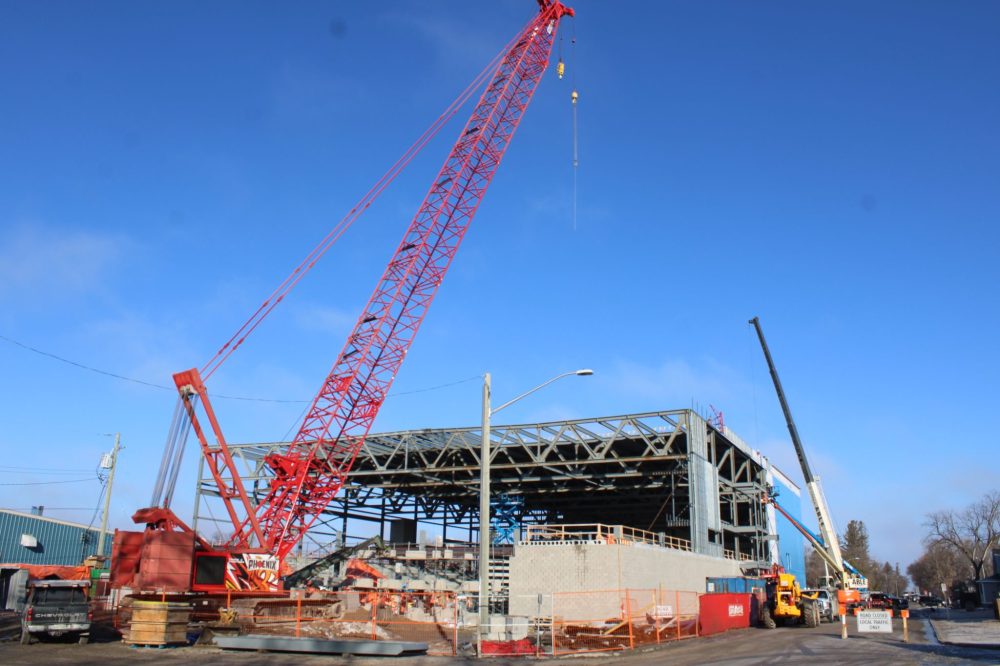Steinbach approves budget, biggest mill rate increase since 2017
Advertisement
Hey there, time traveller!
This article was published 06/04/2024 (491 days ago), so information in it may no longer be current.
Steinbach residents will see a 5.1 percent mill rate increase after city council unanimously approved their financial plan on Tuesday.
The general operating budget increased by nearly 12 percent, and a $62.7 million capital budget prompted a mill rate increase that was the largest since 2017, and only the second in the last decade to exceed five percent.
The municipal property tax rate will increase to 14.4 mills. Taxpayers will also see increased user fees, an increase of four percent to utility rates, 2.6 percent for residential garbage collection, 2.5 percent for land use applications and a five percent increase in the cost of applying for permits.

Senior Manger of Finance Brian Hrehirchuk presented the financial plan to council and four members of the public.
He highlighted the capital budget which will see $46.1 million for the events centre and $16.5 million for a capital renewal program for the replacement of equipment and infrastructure which includes the Loewen Boulevard and Highway 12 intersection, lift station upgrade and Hanover Street renewal.
Projects this year also include $1.3 million to purchase a tandem dump truck and landfill loader.
Using what the city calls an average dwelling market value of $225,000, city property taxes will total $1,458 this year. That’s up about $71 over last year’s bill on the property of the same value.
This year’s budget also includes $1.1 million for waste reduction and recycling, $453,000 for the Jake Epp Public Library, $267,000 for beautification, $63,000 for Dutch Elm Disease prevention and $30,000 for Canada Day activities.
Grants were also included for areas like the library at $386,000, Chamber of Commerce at $214,000, Steinbach Arts Council at $155,000, Accessible Transit at $105,000, Summer in the City at $65,000, and Mennonite Heritage Village at $53,000.
Other smaller grants were given to Headway, and STARS.
The city also took on new debt this year.
In 2024, $16 million of new debt has been added while just $1.5 million of debt will be retired. New debt includes $12.5 million for the events centre and $3.5 million for the Loewen Boulevard and Highway 12 intersection.
With an average interest rate of 4.18 percent, $209,000 will be spent on interest this year.
The total debt burden of $19.5 million represents 8.8 per cent of the total city tax rate, or 1.27 mills.
Coun. Michael Zwaagstra made the motion to approve the financial plan, noting it’s the toughest budget he can recall in his tenure as councillor which stretches back to 2006.
“We’ve been dealing with inflation particularly in regard to construction costs,” he said. “This is not unique to us; we’re seeing this across the country.”
Zwaagstra said while it was a challenge, they wanted to ensure city residents continue to get the services they need.
“We’re not willing to sacrifice the quality of the services that people get,” he said. “We’re not willing to sacrifice in regard to our infrastructure program and we’re obviously moving ahead with the projects that we have.”
He said that while paying interest on loans has risen since the days of two percent financing, they are sticking with their policy of paying off all loans within five years.
“I don’t know of any municipality anywhere in the country that is building an event centre like what we have that will be debt free in five years,” he said. “That is something that I think we can be very proud of.”
“We are continuing to provide the excellent services that the people have become accustomed to and the only way to be able to continue doing all that is to grow this budget which does mean that this year there is an increase,” he added.
Other councillors echoed his sentiments, with Coun. Jac Siemens saying there is benefit to spending money on things like infrastructure.
“One of the key things this council has always done is focus on infrastructure renewal, and we have a lot fewer issues in our community with our infrastructure than many communities have,” he said.
Despite the increase, Siemens said they were careful.
“I think this is a good budget,” he said. “We have held back; we’ve taken some of our projects and we have spread them into upcoming years.”
Coun. Damian Penner pointed out that many costs covered by the city are essential.
“It’s important to remember that as municipally elected officials we’re dealing with a budget where there’s not a lot of discretionary spending,” he said.
Mayor Earl Funk also described it as a good and progressive budget.
“We’re getting a lot of work done and there’s a lot of development in our community because I believe we are proactive, because we do make sure our roads are in good shape,” he said. “We make sure that there are lots to build on…”
He too noted that this increase was higher than they’re used to.
“I think it’s appropriate for this time,” he said.
The City of Steinbach includes residents who use 5,500 water and wastewater connections and 208.6 km of underground pipe, 144.4 km of total road surface, 18 RCMP officers, and 46 firefighters. They employ 145 FTE positions, with 300,000 labour hours annually with a financial cost of $11.2 million. Meanwhile their recreation services host more than 100 baseball, football and soccer games, more than 40 hockey and ringette teams, 99,000 public swims and 5,100 swim lessons with 42,500 individual lessons and 260 acres of green space and parks.
